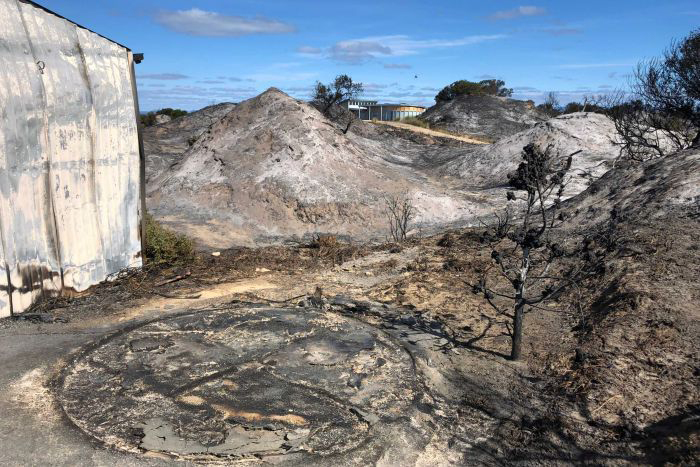At last, a warning that no political leader in their right mind would ignore

For many years I have avoided focusing too much on scientists’ personal thoughts about the future of the global climate. Like them and many others, I felt we should not be stirring fear among people.
But a determined Swedish schoolgirl named Greta Thunberg has changed my thinking. This is what she said to the world’s rich and powerful at the 2019 World Economic Forum in Switzerland:
“Adults keep saying, we owe it to the young people to give them hope. But I don’t want your hope. … I want you to panic. I want you to feel the fear I feel every day. And then I want you to act… as if the house was on fire. Because it is.”
Scientists and schoolchildren are not alone. Farmers and townspeople in the Darling River basin have expressed fear at the prospect of having to abandon their drought-ravaged region. Now they have been joined by fire and emergency people.
“We’re frightened,” Greg Mullins, a former NSW Fire and Rescue Commissioner, and still an active firefighter with nearly 50 years’ experience, told a radio interviewer last week. He expressed that fear in an unprecedented public statement issued through the non-government Climate Council last week.
The statement’s 23 signatories – former fire and emergency service leaders in all states and territories – include the two most recent past chief officers of the Tasmania Fire Service: Mike Brown, who retired in 2016, and his predecessor John Gledhill, who headed the TFS for 14 years from 1995.
They sought to brief prime minister Scott Morrison on our failing capacity to deal with wildfire, flood and other emergencies, and called on state and territory governments to focus on adapting to climate change and acting strongly to cut emissions.
The statement bluntly warned political leaders that “there should be no doubt in anyone’s mind: climate change is dangerous and it is affecting all of us now.”
“Increasingly catastrophic extreme weather events”, it said, “are putting lives, properties and livelihoods at greater risk and overwhelming our emergency services”. These events have been worsened by climate change “driven mainly by the burning of coal, oil and gas”.
The statement said that whereas staggered northern and southern hemisphere fire seasons, and differing fire seasons within Australia, had allowed the exchange of aerial water bombers, trucks and firefighters, this is now being severely limited because of longer fire seasons everywhere.
As if on cue, on the same mid-autumn day that the statement was released a fierce blaze erupted in bone-dry coastal scrub at Dolphin Sands in Tasmania’s east, forcing evacuations and destroying a home. The fire broke away from an approved hazard-reduction burn on private land, highlighting the statement’s warning that warmer, drier winters are decreasing opportunities for such burns.
When we feel fear, we need to act. At a local level at least, practical steps are being taken. Hobart’s extensive bushland margins make it especially vulnerable to wildfire attack. Three weeks ago Hobart mayor Anna Reynolds launched a public airing of the city’s long-term protection strategy.
Fire ecologist David Bowman introduced a panel of fire experts from Christchurch, Melbourne and Hobart in a public discussion of “green firebreaks” – areas of land around the city perimeter where fire-prone understorey plants are removed and replaced with species more able to resist fire attack.
If this idea takes root, so to speak, it will signify a shift in the way Hobartians view the mountain’s natural ecology – not simply as a much-loved natural asset but also as a potential danger that needs active management. Such is the price for living close to nature in a warming, drying climate.
As Simon Bevilacqua said in his weekend column in the Hobart Mercury, fire and emergency people are on the front line of climate awareness. They must stay abreast of current conditions out in the landscape because their communities, their work, their personal wellbeing and sometimes their lives depend on it.
“We don’t frighten easily, as fire and emergency chiefs,” Mullins told ABC Radio National’s Fran Kelly after release of the fire and emergency elders’ statement. But now, he added, we are in a “climate emergency”.
“Over the years we’ve had to calm down the community when an emergency is happening, and talk straight to them, too, when it’s very severe…. Now it’s time for some straight talk.
“I’ve been fighting fires since 1971… We’re [now] seeing fires burning at times they shouldn’t burn, in the middle of winter, at an intensity that you’d expect in midsummer. The fire seasons are months longer than they used to be. Fires are burning … where they shouldn’t burn, like rainforest.”
Having for years dodged or dismissed questions about climate change, governments are now faced with undeniable evidence of its growing impact on public safety. Their silence is deafening.
We badly need the fear that is now part of the working lives of firefighters and emergency workers to spread to their political masters. Only then, I believe, will we see some real action.
